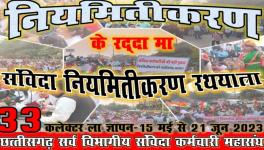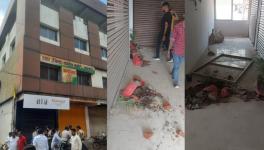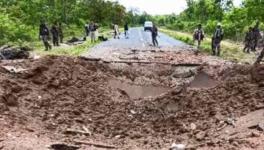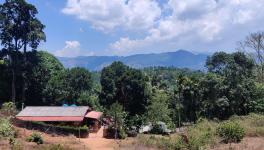TRIBAL FILES: Thousands Displaced by Salwa Judum Urge Centre to Rehabilitate Them
New Delhi: As the country engages in a debate on the displacement of Kashmiri Pandits, there is no discussion on the largest displacement in Central India -- of thousands of families, mostly tribals, who have been forced to leave their state after being harassed by the police and due to Naxalite violence.
On Wednesday, more than 100 people reached Delhi and held a symbolic protest at Jantar Mantar.
Under the banner of Valsa Adivasulu Samakhya, an organisation of displaced people, the displaced persons held a press conference here on Wednesday and urged the Narendra Modi government, along with the state governments, to rehabilitate the displaced tribals from Central India, most of whom are from Chhattisgarh.
These displaced persons are currently settled in Andhra Pradesh and Telangana and said that the governments there were trying to evict them.
Narrating their ordeal, some of the displaced people who came to Delhi said due to police and Naxal violence in 2004-05, as many as 55,000 tribals had to leave Chhattisgarh and go to Andhra Pradesh, Telangana, Maharashtra, Madhya Pradesh and Odisha, where they have been living on the edges of forests and are mostly engaged in farming and animal husbandry.
Most of these displaced tribal community members who came to Delhi are living in the forests bordering Telangana and have no access to any basic facilities. They do not have the benefit of reservation or facilities like job cards, ration cards, health insurance cards etc.
They blame this on the Salwa Judum movement that started in the newly formed state of Chhattisgarh.
What was the Salwa Judum movement?
It was a movement against Naxalites in Chhattisgarh, which was also supported by the governments at the Centre and state. It aimed to turn the local people against Naxalites, say many critics.
The 'Salwa Judum' movement started in 2005 and Congress leader Mahendra Karma, who was killed in an attack by Naxals in 2013, was believed to be its key leader.
The word 'Salwa Judum' is from Gondi (tribal) language, which means 'Caravan of Peace'. But the movement was anything but peaceful. Rather, the perception was that the then governments “used” the local villagers in an attempt to defeat Naxal forces, by putting them in the frontline. The villagers were provided modern weapons and made to believe that they were part of the police force.
As a result, the villagers also became targets of Naxalites. A different phase of violence started and villages were attacked, forcing hundreds to flee.
However, in 2008, the Supreme Court declared the entire movement as unconstitutional and said it was the responsibility of the police and security forces to deal with Maoists and Naxalites. The local administration cannot push any citizen to death to hide their weakness, the court said. In this way, in 2008, this campaign was ended, as it was completely unconstitutional.
The Present Context
Coming back to the present issue—the resettlement of displaced tribal persons – it may be noted that a majority of these people are living in the Dandakaranya forests that are part of Telangana.
Speaking with NewsClick, journalist-turned-social worker Shubhranshu Choudhary, who has been fighting for the rights of the displaced persons for long, accused the government of using the coronavirus pandemic as an “opportunity” to harass these displaced people. He said the people displaced from Chhattisgarh initially moved to Andhra Pradesh. After the bifurcation of the state, most of the displaced are now in Telangana.
According to Chowdhury, in the past two years, when the corona epidemic was raging, the Telangana government started taking possession of lands of the Salwa Judum victims. The media and the rest of the society did not pay much attention to this.
As a result, during the corona period, the government managed to occupy almost half of the land of the displaced persons. Their houses were demolished. Although they do not have any written ownership of these lands, these people were making a living from it, said Chowdhury.
The dense Dandakaranya forest is spread over four-five states. When these tribals faced death in Chhattisgarh, they migrated to Andhra Pradesh and Telangana within 40-50 km of the forest.
Chowdhury said now the governments of Andhra Pradesh and Telangana are driving these people away from the area. They wanted to send them back earlier also but were not able to do so due to court orders,
However, since the past three months, the government has started taking possession of the land. In fact, forest department officials have captured more than half of the land of these displaced persons and have planted saplings on it, he alleged.
The displaced people are constantly being asked to go back to Chhattisgarh, Chowdhury said, adding that most of them still do not want to go back to their villages because of fear of Naxal violence. “They don't feel a sense of security there right now,” he said.
Commenting on the threadbare discussion in the country and media on the film, Kashmir Files, Chowdhury said if the Central government also sees ‘Tribal Files’, then the lives of thousands of displaced people could also improve.
In a statement released at the press conference, the tribal organisation, citing the Forest Rights Act, said that Act does not state that the land given in return should be in the same state. So, legally the displaced persons should be given land rights in AP and Telangana in exchange of the forest land they left behind in Chhattisgarh 15 years ago.
In Andhra and Telangana, these adivasis live in the same Dandakaranya forest. They say they fail to understand why time and again the government changes the name of the place and with it the rules also change. For example, in Chhattisgarh, they are called Muria Gond Adivasis, but in Andhra Pradesh and Telangana they are not considered adivasis.
On April 4, the displaced tribal people met Chhattisgarh Chief Minister Bhupesh Baghel. He was positive and said that if tribals, who had to leave their homes and villages, wanted to return, then the government would make arrangements for their safety and stay.
According to a report in Dainik Bhaskar, during the meeting with Baghel, the delegation requested him to settle them in some suitable place and make land available for agriculture.
The Chief Minister reportedly assured them that along with land to those who want to return to Chhattisgarh, the government would provide basic facilities, including rations, education and employment. He asked the Additional Chief Secretary of the Home Department Subrata Sahu and Director General of Police Ashok Juneja to take appropriate steps, as per reports.
The organisation of the displaced persons, in the statement, also requested the Centre to prepare a rehabilitation plan in Central India by taking all the states along, for rehabilitation of Salwa Judum victims on the lines of the Bru Rehabilitation Scheme for Bru tribals who migrated to Tripura due to violence in Mizoram.
They said that because the face-off between the police and Naxals is still on in Chhattisgarh, the proposal to give them land around CRPF camps would expose them to Naxal attacks. Also, since jobs are very few, they wanted land in lieu of land.
Citing the policy on rehabiltation of Bru tribls who have the right to live where they are, the displaced tribals said according to the provisions of Section 3.1.M of the Forest Rights Rules, 2006, in Andhra Pradesh and Telangana, whoever is in possession of forest land, should be given its right so its maintenance does not become a problem.
This issue was also raised in Lok Sabha recently by Congress MP from Bastar, Deepak Baij. He said thousands of tribals from hundreds of villages of Naxal-affected areas like Bastar, Dantewada, Bijapur, Sukma etc. had left their homes and villages and migrated to border villages in Andhra Pradesh and Telangana.
After migrating about 15-16 years ago, they settled in Andhra Pradesh and Telangana, where the tribals are being forcibly expelled by the governments there, Baij said, adding that “their houses are being demolished. These tribals are being forced to live in the shadow of fear and are being forced to migrate again.”
The Congress leader said that the matter was serious and was related to three states -- Telangana, Andhra Pradesh and Chhattisgarh -- so the Central government should immediately intervene and provide justice to the displaced tribals.
(Translated from Hindi by Aditi Nigam)
Get the latest reports & analysis with people's perspective on Protests, movements & deep analytical videos, discussions of the current affairs in your Telegram app. Subscribe to NewsClick's Telegram channel & get Real-Time updates on stories, as they get published on our website.
























